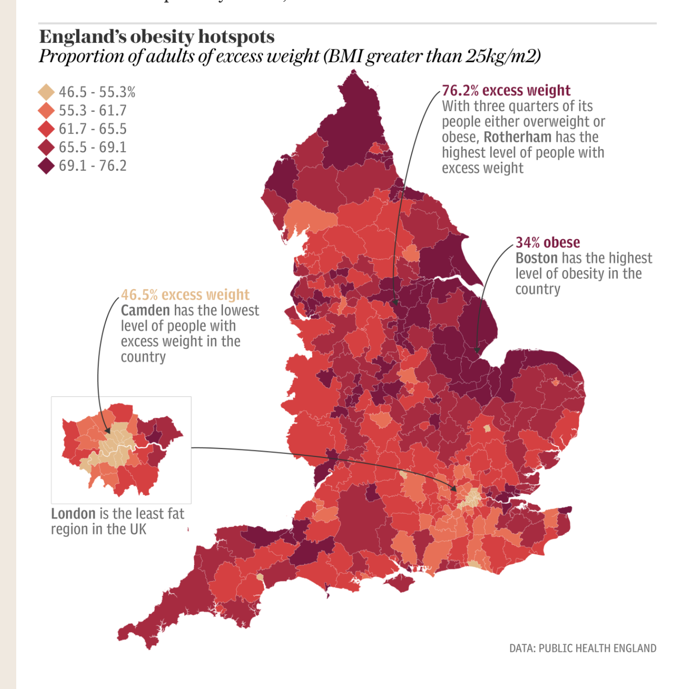
Source of Map: The Telegraph 23/1/18
Joe’s Comments
Humans have not changed so much over the past decades that they have lost all will-power to resist the temptation of alluring foods (usually those ready-meal processed fast-foods, packed with saturated fats and added sugars); nor has human nature changed so much that we have lost our intelligence and common-sense to know which foods are likely to harm us.
So why is obesity (and all its associated chronic diseases) increasing so rapidly year on year?
It may be argued that the answer will be found by following the money. While our bodies are getting fat, whose bank balances are getting fat? Unilever, Kraft, Pepsico, Coca-Cola, McDonalds and Subway are but a small proportion of the thousands of companies that profit from producing, distributing, marketing and selling ultra cheap junk food.
Persuasive and all-pervasive advertising ensures we can’t get away from it – in every location from schools and hospitals, cereal packets, clothing, toys, games, movies, TV shows, internet sites, magazines, newspapers, bill boards, the sides of buses, every square metre of supermarket display space….everywhere and anywhere that it can possibly be advertised in association with happy, carefree, beautiful lifestyles that we aspire to have for ourselves.
And we humans conform to the simplest rules that apply to all life forms:
- We avoid pain.
-
We seek pleasure.
-
We conserve energy.
So when we are told over and over again that we need these foods to survive, that they will not harm us (if consumed in moderation – which they rarely are), that we see everyone else eating them (and so the food MUST be okay), then we make them part of our normal diets.
These products are specifically developed in laboratories in order to stimulate the pleasure receptors on the tongue and in the brain, so our bodies cannot help but crave them.
And, finally, they are made incredibly easy to find and buy – where can you go now without a Costa accosting you at every turn? Which town centres can you walk through without there being a line of fast-food shops on almost every street? Which websites, TV programmes, magazine, newspapers and movies can you look at without being exposed to everything from luscious chocolate treats to crunchy cheesy snacks?
Simply put – it’s too easy. Our natural tendency to conserve energy means that we just give in to what’s easiest, most convenient to buy, prepare, digest, grow fat and ill on.
And this also applies to what is easiest for our brains and emotions. Just think about it – is it easier or harder to simply carry on eating like everyone else does at home, in the restaurant and at friends’ houses? We are creatures of habit who opt for the easiest way of doing things; and because habit requires less energy consumption, we just continue doing what we and everyone else around has been doing, without sparing too many thoughts about whether it is good for us or not.
The Telegraph reporter (Laura Donnelly, health editor) writing in connection with the above UK obesity map says:
” [we are witnessing] the Child obesity crisis: Millions doomed to early death as doctors call for urgent action over junk food. Children are being doomed to an early death by their lifestyles – with four in five obese school pupils destined to remain dangerously overweight for life..One in three school pupils are overweight or obese by the time they leave primary school…Fifty per cent of pregnant women are overweight or obese, which has a severe impact on the health and weight of the developing foetus.”
The government faces enormous pressure from the food, pharmaceutical and medical industries to maintain the status quo. Who can tell when and what will bring about a real turning point in the nation’s self-harming love affair with the modern unhealthy diet?
Do we really expect industry, government or the medical profession to do much about this horrendous state of affairs?
Perhaps all we can do as individuals is to ensure that we eat a whole food plant-based diet, as organic in origin and unprocessed in form as possible. It is argued that simply doing this will allows us as individuals to have the most positive impact on the three main areas involved when discussing human eating habits:
- Human health.
-
Animal health.
-
Environmental health.

Of course we can encourage and advise others to transition to the optimal diet for health and well-being; but one thing I have come to realise about this whole complex and fascinating area of diet and nutrition is that it appears easier for most people to stop smoking cigarettes or drinking alcohol than it is for them to radically change their eating habits.